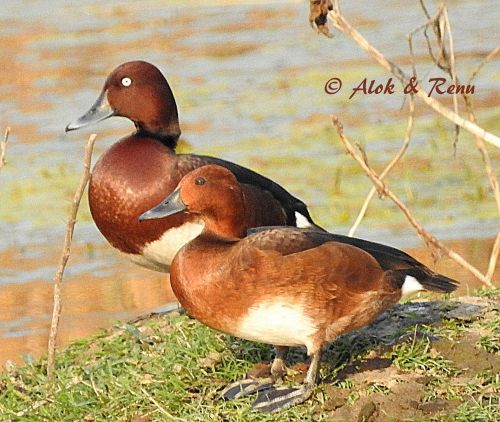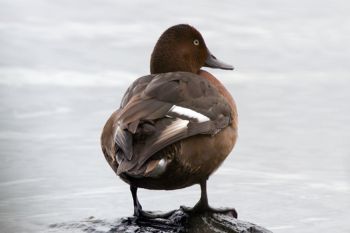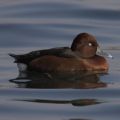(User template) |
(Picture of 1st winter male. References updated) |
||
| (21 intermediate revisions by 5 users not shown) | |||
| Line 1: | Line 1: | ||
| − | + | '''Alternative name: Ferruginous Pochard''' | |
| − | '''Alternative name: Ferruginous | + | [[Image:ferruginous_duck_alok.JPG |thumb|500px|right|Male and female<br />Photo © by {{user|aloktewari|Alok Tewari}}<br />[[Keoladeo National Park]], Bharatpur, Rajasthan, [[India]], 29 February 2016]] |
| − | [[Image: | ||
;[[:Category:Aythya|Aythya]] nyroca | ;[[:Category:Aythya|Aythya]] nyroca | ||
| − | |||
==Identification== | ==Identification== | ||
| + | [[File:BF Ferruginous Duck First winter male SandP.jpg|thumb|350px|right|First Winter Male<br />Photo © by {{user|Sandpiper|Sandpiper}}<br />King's Mill Reservoir, [[Nottinghamshire]], [[UK]], 3 November 2010]] | ||
| + | 38–42 cm (15-16½ in) | ||
| + | *Black-tipped grey bill | ||
| + | *Steep forehead<br /> | ||
| + | '''Male''' | ||
| + | *Reddish-brown plumage | ||
| + | *White under tail | ||
| + | *White eye | ||
| + | '''Female''' similar but duller with a brown eye | ||
==Distribution== | ==Distribution== | ||
| + | Discontinuous [[Palearctic]]; winters to [[India]], south-east [[Asia]] and eastern [[China]]. | ||
==Taxonomy== | ==Taxonomy== | ||
| + | This is a [[Dictionary_M-O#M|monotypic]] species<sup>[[#References|[1]]]</sup>. | ||
==Habitat== | ==Habitat== | ||
| + | Wet forests, rivers, estuaries and reservoirs and urban lakes. | ||
==Behaviour== | ==Behaviour== | ||
| + | ====Action==== | ||
| + | They feed by diving and dabbling. | ||
| + | ====Diet==== | ||
| + | Their diet consists of aquatic plants and insects; also molluscs and small fish. They often feed at night. | ||
====Vocalisation==== | ====Vocalisation==== | ||
| − | + | {{ Audio|Aythya nyroca (song).mp3 }} | |
| − | + | ==Gallery== | |
| + | Click on image to see larger version | ||
| + | <gallery> | ||
| + | Image:IMG 8839s.jpg|Photo © by {{user|CyberKat|CyberKat}}<br />Zasavica Nature Reserve, [[Serbia]], 22 April 2007 | ||
| + | Image:Ferruginous_Pochard.jpg|Photo © by {{user|Momo|Momo}}<br />Morges, [[Switzerland]], November 2005 | ||
| + | </gallery> | ||
| + | ==References== | ||
| + | #{{Ref-Clements6thOct23}}#Birdwatchers Pocket Guide ISBN 1-85732-804-3 | ||
| + | #Birdforum Member observations | ||
| + | {{ref}} | ||
==External Links== | ==External Links== | ||
| − | {{GSearch|Aythya | + | {{GSearch|"Aythya nyroca" {{!}} "Ferruginous Duck"}} |
| − | + | <br /> | |
| − | [[Category:Birds]] [[Category:Bird Songs]] [[Category:Aythya]] | + | {{VSearch|"Aythya nyroca" {{!}} "Ferruginous Duck"}} |
| + | {{GS-checked}}1 | ||
| + | <br /> | ||
| + | <br /> | ||
| + | |||
| + | [[Category:Birds]] [[Category:Bird Songs]] [[Category:Aythya]] [[Category:Videos]] | ||
Latest revision as of 13:58, 10 January 2024
Alternative name: Ferruginous Pochard

Male and female
Photo © by Alok Tewari
Keoladeo National Park, Bharatpur, Rajasthan, India, 29 February 2016
Photo © by Alok Tewari
Keoladeo National Park, Bharatpur, Rajasthan, India, 29 February 2016
- Aythya nyroca
Identification
38–42 cm (15-16½ in)
- Black-tipped grey bill
- Steep forehead
Male
- Reddish-brown plumage
- White under tail
- White eye
Female similar but duller with a brown eye
Distribution
Discontinuous Palearctic; winters to India, south-east Asia and eastern China.
Taxonomy
This is a monotypic species[1].
Habitat
Wet forests, rivers, estuaries and reservoirs and urban lakes.
Behaviour
Action
They feed by diving and dabbling.
Diet
Their diet consists of aquatic plants and insects; also molluscs and small fish. They often feed at night.
Vocalisation
Gallery
Click on image to see larger version
Photo © by Momo
Morges, Switzerland, November 2005
References
- Clements, J. F., P. C. Rasmussen, T. S. Schulenberg, M. J. Iliff, T. A. Fredericks, J. A. Gerbracht, D. Lepage, A. Spencer, S. M. Billerman, B. L. Sullivan, and C. L. Wood. 2023. The eBird/Clements checklist of Birds of the World: v2023. Downloaded from https://www.birds.cornell.edu/clementschecklist/download/
- Birdwatchers Pocket Guide ISBN 1-85732-804-3
- Birdforum Member observations
Recommended Citation
- BirdForum Opus contributors. (2024) Ferruginous Duck. In: BirdForum, the forum for wild birds and birding. Retrieved 8 May 2024 from https://www.birdforum.net/opus/Ferruginous_Duck
External Links
GSearch checked for 2020 platform.1






